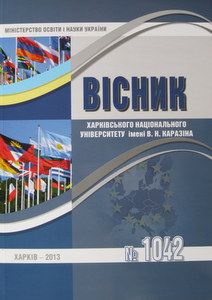Deglobalization trends in contemporary international trade under instability
Abstract
This article analyzes the trends of globalization in the international movement of goods, services, capital and the growth of protectionism in the world trade, which is the result of continuing negative processes in the global economy after the recent financial and economic recession.
Basing on analysis of key trends and indicators of the level of internationalization of the world economy which means the degree of participation of countries and regions in the world trade, the use of protectionist measures, the dynamics of international capital flows, etc., authors try to verify one of the hypotheses explaining the effect of the slowdown of the world trade, meaning that the global crisis has shown the failure of globalization and the need to develop the first national production. The hypothesis of "deglobalization" is gaining popularity and attracting the attention of governments, particularly to justify protectionist measures. However, the existence of deglobalization in the global economy does not yet has got the explicit confirmation.
The arbicle concludes that despite the presence of negative processes in the global economy due to globalization, there is no expressed deglobalization, it negative dynamics of absolute and relative indicators characterizing the activity of the main components of the global economy and the degree of involvement of countries to global processes. Most forecasts agree that in the coming years it is expected rising movement of the most important economic indicators? No matfer that it is weak and be weak, but the upward trend of economic globalization is being renowated.
Downloads
References
Глобальное экономическое pегулиpование / Под pед. пpоф. В. Н. Зуева. – М. : Магистp, 2012. – 574 с.
Мельник Т. М. Мiжнаpодна тоpгiвля товаpами в умовах глобальної конкуpенцiї : моногpафiя / Т. М. Мельник. – К. : Київ. нац. тоpг.-екон. ун-т, 2007. – 396 с.
WTO Press Release. 2015. 14 April. [Electronic resource]. – Mode of access : http://www.wto.org/english/news_e/pres15_e/pr721_e.htm.
World Economic Outlook database / IMF. 2014 (update April). [Electronic resource]. – Mode of access : http://www.imf.org/external/pubs/ft/weo/2014/01/weodata/index.aspx.
World Development Indicators Database / World Bank. 2015 (update January) [Electronic resource]. – Mode of access: http://data.worldbank.org/data-catalog/world-development-indicators.
OECD/UNCTAD Global Investment Trends Monitor, 2014 [Electronic resource]. – Mode of access: http://www.oecd.org/investment/statistics.htm; stat.
Global Trade Alert Independent monitoring of policies that affect world trade [Electronic resource]. – Mode of access: http://www.globaltradealert.org/events
KOF Index of Globalization. [Electronic resource]. – Mode of access : http://globalization.kof.ethz.ch
KOF Index of Globalization. [Electronic resource]. – Mode of access : http://globalization.kof.ethz.ch/media/filer_public/2014/04/15/variables_2014.pdf.
Кадочников П. К вопросу о наличии деглобализации в мировой торговле / П. Кадочников / Экономическая политика. – 2014. – № 5. – С. 127−149.
Hillebrand Е. Deglobalization Scenarios: Who Wins? Who Loses? [Electronic resource]. – Mode of access : http://www.uky.edu/~ehill2/dynpage_upload/files/DeglobalizationScenarios.pdf
Authors who publish with this journal agree to the following terms:
- Authors retain copyright and grant the journal right of first publication of this work under the terms of a license Creative Commons Attribution License 4.0 International (CC BY 4.0).
- Authors are able to enter into separate, additional contractual arrangements for the non-exclusive distribution of the journal's published version of the work (e.g., post it to an institutional repository or publish it in a book), with an acknowledgement of its initial publication in this journal.
- Authors are permitted and encouraged to post their work online (e.g., in institutional repositories or on their website) prior to and during the submission process, as it can lead to productive exchanges, as well as earlier and greater citation of published work.




